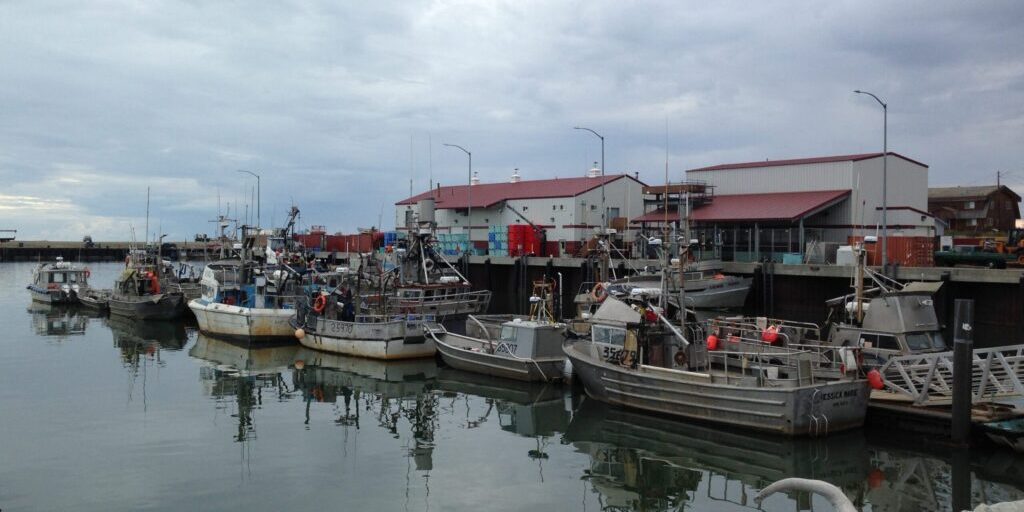Commercial fishing in the Norton Sound region is on track for the summer season, as winter commercial crabbing wraps up in Nome. With added consideration for COVID-19, extra requirements are expected to be put on commercial fishers and processors alike.
According to Jim Menard, the Norton Sound area manager for the Alaska Department of Fish & Game, two crabbers participated in the regional winter commercial season, which began at the end of February. Menard says since there were less than three commercial fishers for the season, he is not required to publicize information regarding their catches.
Regardless, the commercial crabbing season will close on Thursday, April 30th, and after that, Menard says the department’s focus will turn towards salmon and summer fishing.
For fishers in the region who are planning to sell their commercial catch this summer, Norton Sound Economic Development Corporation has announced they will have a buyer. According to a press release this month from NSEDC, they will operate Norton Sound Seafood Products.
“The decision we’ve made to move forward and operate this season is one that we have not taken lightly.”
– Tyler Rhodes
Tyler Rhodes is the Chief Operating Officer at NSEDC. According to Rhodes, this new announcement will not affect NSEDC’s earlier decision from February to not purchase Norton Sound Red King Crab. The corporation said it made that unprecedented announcement out of concern for the future of crab stocks in the Norton Sound region.
As per a health mandate released by the Governor last week, commercial fishing vessels and tenders or processors must take extra measures while operating this summer. Vessel captains are required to maintain a ship’s log that documents their protective plan and certifies the vessel has followed the state mandate’s rules.
According to Rhodes, more information will be forthcoming from NSEDC on the requirements anticipated of Norton Sound commercial fishers.
“And that’s one area where we’re currently looking into just how those regulations apply to our fleet. I think a lot of what’s being setup is more contemplating an outside fleet coming into an area where they are not currently at. So there are some meetings and calls we’re getting on this week to just get a better sense of what’s required in that mandate regarding the resident fleet.”
Based on language in the state’s mandate, crew members will have to go directly to their self-quarantine location or boat upon arriving into their respective fishing community. Any independent vessel captain must sign a Health Mandate 017 acknowledgement form prior to commercial fishing, and be able to vouch for their crews’ compliance with quarantine and screening requirements. Similarly, any tender or processor wishing to purchase fish from a fishing vessel must receive a confirmed copy of the captain’s acknowledgement form.
In order to protect the crew, and members of the public, the Governor’s health mandate on commercial fishing says all vessel crew members will be subject to a screening before getting onboard their boats. The “verbal screening” involves answering a set of questions and the “physical screening” would require them to have their temperature taken.
Nome’s City Manager, Glenn Steckman, has said that all travelers coming into Nome, including commercial fishers, will be required to self-isolate for 14 days upon their arrival, which is in line with the Governor’s mandates.
Even though the corporation’s plans aren’t finalized yet, Rhodes says NSEDC will be complying with any local and state measures related to COVID-19 in addition to taking extra safety precautions.
“We’re going to limit access to our [processing] plants as much as possible. That’s going to mean only those who are essential to making that plant operate are going to be allowed on site. We’re going to restrict access to the public. We’re going to look at ways to allow fishermen to do their business, but keep as clear of the plant and our workforce as possible; so that’s having specific locations where we’ll process fish tickets and interact with fishermen.”
Both Menard and Rhodes mentioned the vast majority of their workforce and commercial fishers are from the region and fishing near their home communities, so they are less concerned about an influx of workers coming in from the outside.
Crabbing will be open this summer, however the Alaska Board of Fisheries seems to have sided with NSEDC and the Northern Norton Sound Fish & Game Advisory Committee. Restrictions passed by the Board last month do not allow commercial crabbing to take place anywhere east of 167 degrees West longitude this summer. That designated off-limits area includes the entire Norton Sound.
According to an emergency order from ADF&G, sport and subsistence fishing may go on this season as planned. But individuals fishing in communities outside of where they live must follow state health mandates.
Image at top: Fishing vessels at the Nome harbor. Photo: Matthew Smith, KNOM




